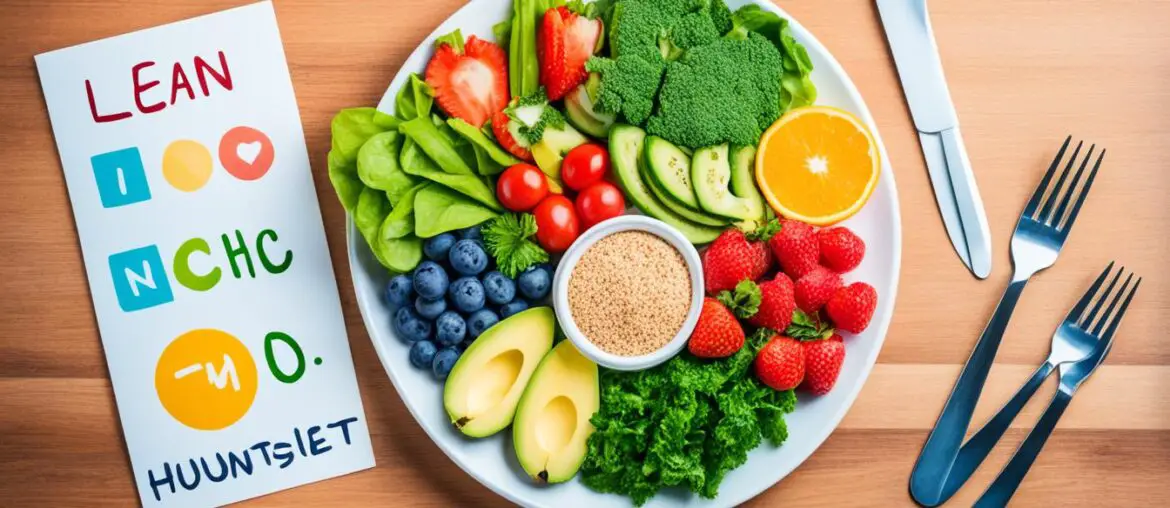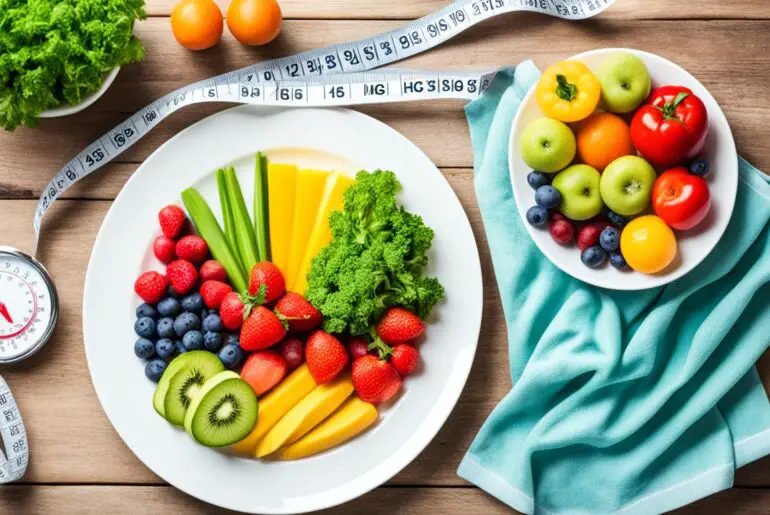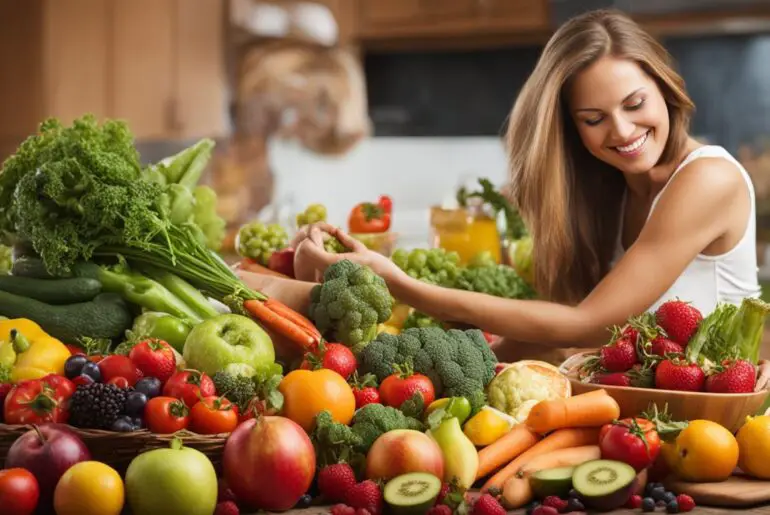Are you struggling with hunger while on the HCG diet? The constant battle between your cravings and your weight loss goals can be discouraging. But what if I told you there are tricks that can help you manage and reduce hunger on the HCG protocol? Discover the secrets to controlling your hunger and achieving success on the HCG diet.
Key Takeaways
- Drinking plenty of water and tea can suppress your appetite on the HCG diet.
- Coffee and green tea are effective natural appetite suppressants.
- Spacing out your meals and never skipping protein are crucial for hunger management.
- Incorporating “free vegetables” into meals can help curb hunger and provide fiber.
- Adjusting your HCG dosage and staying hydrated are additional strategies for hunger control.
Water, Tea, and Coffee
When it comes to hunger control on the HCG Diet, proper hydration plays a vital role. Drinking an adequate amount of water, ideally 2-4 liters per day, can help reduce cravings and manage hunger. Dehydration can actually increase feelings of hunger, so staying hydrated is key to staying satisfied on the HCG Diet.
“Water is the elixir of life.” – Unknown
In addition to water, tea and coffee can also be effective tools for appetite suppression on the HCG Diet.
Tea for Appetite Suppression
Tea, especially green tea, is well-known for its appetite-suppressing properties. This natural beverage contains compounds like catechins and flavonoids that can help boost metabolism and reduce hunger cravings.
“Tea is the magic key to the vault where my brain is kept.” – Frances Hardinge
Coffee as an Appetite Suppressant
Coffee can also help control appetite when consumed black. The caffeine in coffee stimulates the central nervous system, suppressing hunger and promoting feelings of fullness. However, it’s important to note that individuals who are sensitive to caffeine should use caution when consuming coffee on the HCG Diet. It’s always best to listen to your body and adjust your intake accordingly.
“Coffee is always a good idea.” – Unknown
Remember, incorporating water, tea, and coffee into your daily routine can help manage hunger and cravings while on the HCG Diet.
Stay hydrated and enjoy a refreshing cup of tea or coffee to support your appetite control efforts on the HCG Diet.
Spacing Out Meals
Finding the right rhythm with meal times is crucial for hunger management on the HCG Diet. The frequency and timing of meals can greatly impact appetite control and overall satisfaction. While individual preferences may vary, experimenting with different eating patterns can help individuals find what works best for them.
Meal Frequency
When it comes to meal frequency on the HCG protocol, there are two main approaches: smaller, more frequent meals or one larger meal. Some individuals find that having smaller meals every few hours helps them stay satisfied and prevents intense hunger. This approach can help maintain a steady energy level throughout the day.
On the other hand, some individuals prefer having one larger meal, typically during lunch or dinner time. Consolidating meals allows for a more substantial and satisfying eating experience, especially for those who prefer to eat larger portions.
Ultimately, the choice between smaller, frequent meals or one larger meal depends on personal preference and what feels most sustainable and satisfying. It may be helpful to consult with a healthcare professional or HCG Diet expert to determine the best eating pattern for individual needs.
Eating Patterns
When it comes to spacing out meals on the HCG diet, there are various eating patterns to consider. These include:
- Intermittent Fasting: Some individuals find success with intermittent fasting, where they restrict their eating window to a specific time frame each day. This approach often involves fasting for a certain number of hours and then consuming all meals within a compressed eating window. This method can help with hunger control and may offer additional health benefits.
- Three Square Meals: Following a traditional three-meal-a-day approach can also be effective for hunger management. Spacing out these meals evenly throughout the day ensures a consistent intake of nutrients and can help prevent excessive hunger.
- Modified Meal Frequency: Another option is to have three main meals while incorporating one or two small snacks. This approach can be ideal for individuals who find it challenging to wait long periods between meals or who experience fluctuations in hunger throughout the day.
It’s important to note that regardless of the chosen eating pattern, it’s crucial to follow the guidelines of the HCG Diet regarding portion sizes and food choices.
By experimenting with different meal frequencies and eating patterns, individuals can find the approach that works best for them in terms of hunger management and overall satisfaction on the HCG Diet.
Next, let’s explore the importance of never skipping protein on the HCG Diet.
Never Skip Protein
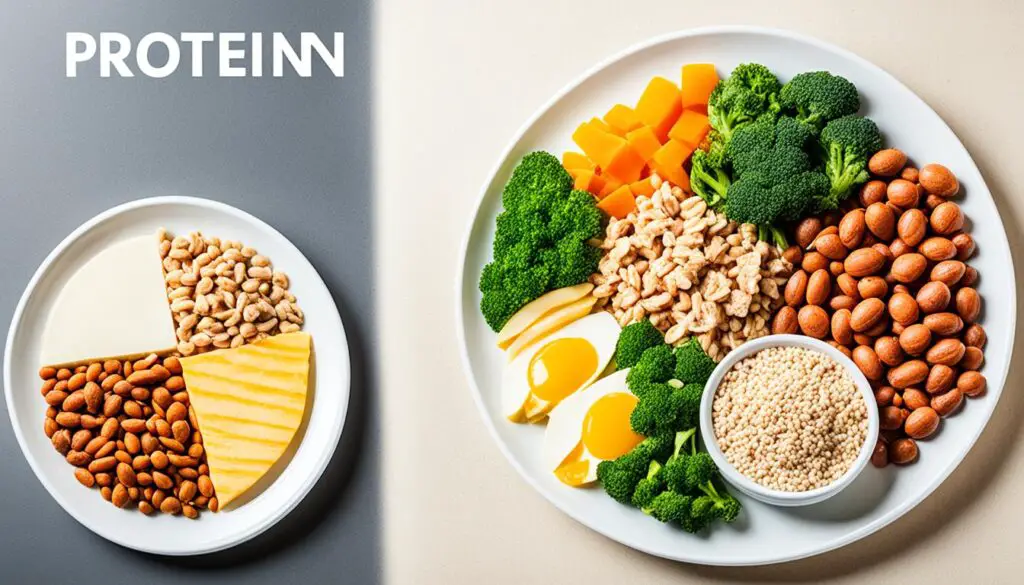
When following the HCG Diet, ensuring an adequate intake of protein is a crucial step in hunger control. Protein provides important nutrients and helps keep you feeling satisfied and full throughout the day. Skipping or reducing protein intake can lead to increased hunger between meals, making it harder to adhere to the HCG protocol.
The recommended amount of protein on the HCG Diet is around 3.5-4 ounces per meal. Including lean sources of protein such as chicken, fish, lean beef, or tofu in each meal is essential. Not only does protein help curb cravings, but it also supports muscle maintenance and repair, which is important during a low-calorie diet.
By prioritizing protein consumption, you can effectively manage hunger on the HCG Diet. Including protein in every meal helps stabilize blood sugar levels and promotes a feeling of satiety, reducing the likelihood of reaching for unhealthy snacks or overeating.
Benefits of Protein on the HCG Diet:
- Keeps you feeling full and satisfied
- Supports muscle maintenance and repair
- Stabilizes blood sugar levels
- Aids in weight loss by increasing metabolism
To ensure you’re getting enough protein on the HCG Diet, plan your meals in advance and include a source of protein in each one. This will not only help control hunger but also provide the necessary nutrients your body needs during this calorie-restricted phase.
Remember, proper protein intake is key to hunger control on the HCG protocol. By fueling your body with adequate protein, you can stay satisfied, reduce cravings, and successfully reach your weight loss goals on the HCG Diet.
Incorporate “Free Vegetables”
As part of the HCG Diet, certain “free vegetables” can be incorporated into meals. These vegetables can be consumed in unlimited quantities, providing both nutritional benefits and hunger management on the HCG protocol. Including fiber-rich vegetables in your meals not only helps curb hunger but also promotes a feeling of fullness and satisfaction.
Some of the approved “free vegetables” on the HCG Diet include:
| Vegetables | Benefits |
|---|---|
| Celery | High in fiber, aids digestion |
| Cucumber | Hydrating, low in calories |
| Radishes | Crunchy, adds flavor to meals |
| Lettuce | Low in calories, adds volume to meals |
| Cabbage | High in vitamins, promotes satiety |
Incorporating these free vegetables into your meals can help manage hunger and provide a sense of satisfaction. Whether as a salad, side dish, or stir-fry, these vegetables add variety and texture to your meals while keeping your hunger in check.
Increase HCG Dosage
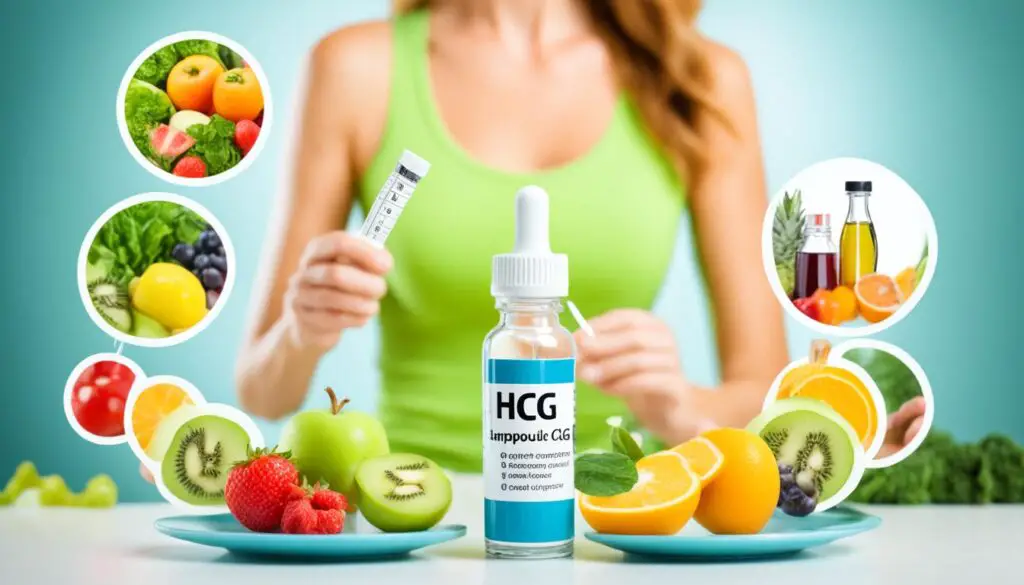
If hunger persists despite implementing the above tricks, increasing the amount of HCG can be an option. This involves adjusting the dosage from the standard 0.5ml three times a day to 0.6ml three times a day. Increasing HCG dosage may help decrease hunger levels within 24 to 48 hours.
Adjusting the HCG dosage can be a potential solution for those struggling to manage hunger while on the HCG Diet. By slightly increasing the daily dosage, individuals may experience a decrease in hunger levels, allowing them to stay on track with their weight loss goals.
| HCG Dosage | Frequency | Results |
|---|---|---|
| 0.5ml | Three times a day | Standard dosage |
| 0.6ml | Three times a day | Potential hunger reduction within 24-48 hours |
Increasing the HCG dosage should always be done under the guidance and supervision of a healthcare professional or dietitian. They can assess individual needs and provide personalized recommendations for adjusting the dosage to manage hunger more effectively. It is important to note that everyone’s response to HCG dosage adjustments may vary, so close monitoring and adjustments may be necessary.
Stay Hydrated
Adequate hydration is crucial for hunger control on the HCG Diet. Drinking plenty of water is not only essential for overall well-being but can also help individuals feel fuller and more satisfied, making it an effective strategy for managing hunger on the HCG Diet.
It is recommended to consume approximately 0.5 to 1 ounce of water per pound of body weight. For example, if you weigh 150 pounds, aim to drink 75 to 150 ounces of water throughout the day. Spreading out water consumption evenly throughout the day is important. Avoid consuming large amounts at once, as this can lead to discomfort.
Staying hydrated on the HCG Diet offers several benefits beyond hunger control. Proper hydration supports optimal bodily functions, aids in digestion, helps regulate body temperature, and promotes healthy skin. By making hydration a priority, you can enhance your weight loss journey and overall well-being.
Eat Green Vegetables
When following the HCG Diet, mixing vegetables may not be permitted, but there is a bright side – you can enjoy unlimited quantities of green vegetables alongside your protein at mealtime. Green vegetables not only provide a wealth of essential nutrients but also offer bulk and satiety, helping you feel more satisfied. Including these fiber-rich greens in your meals can be a game-changer when it comes to hunger management on the HCG Diet.
Green vegetables play a crucial role in hunger control on the HCG Diet. They are packed with vitamins, minerals, and antioxidants, promoting overall health while keeping hunger at bay. These vegetables provide the necessary bulk to your meals, making you feel fuller for longer and reducing cravings.
Here are some top green vegetables to incorporate into your HCG Diet meals:
- Spinach
- Kale
- Broccoli
- Asparagus
- Cabbage
- Green beans
By adding an abundance of these green vegetables to your plate, you not only enhance the nutritional value of your meal but also provide yourself with extra fiber, which can aid digestion and support a healthy gut.
While green vegetables are highly encouraged, it is important to note that some individuals may experience stalls in weight loss due to specific vegetables, such as tomatoes and onions. Therefore, it is advisable to limit their consumption if you notice this effect on your progress.
Remember, the HCG Diet is a structured program designed to optimize weight loss while promoting a healthier lifestyle. By enjoying unlimited green vegetables on the HCG protocol, you can support your hunger management efforts while reaping the many benefits of these nutritious veggies.
Proper Loading and Fruit Intake
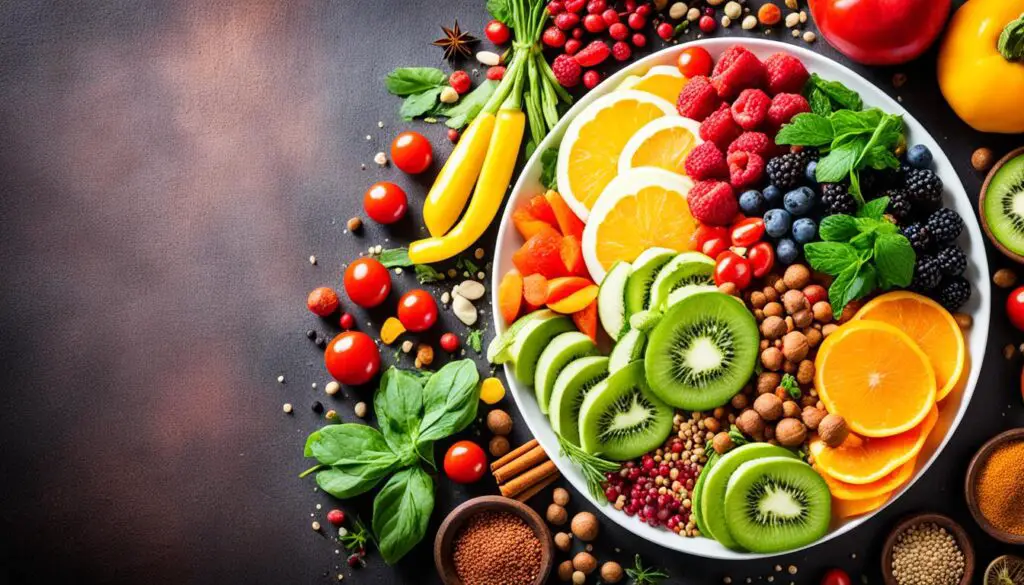
During the loading phase of the HCG Diet, it is important to focus on consuming high-fat foods instead of high-carb foods. Proper loading with high-fat foods can help prevent excessive hunger and cravings in the early stages of the diet. By fueling your body with fats, you can provide a source of sustained energy, which can help manage hunger and promote adherence to the program.
Additionally, spacing out fruit intake throughout the day can be a helpful strategy for hunger management on the HCG protocol. Rather than consuming all your fruit servings at once, distributing them across your meals and snacks can help keep you feeling satisfied throughout the day. This approach prevents sudden spikes in blood sugar levels, which can lead to hunger and cravings later on.
To optimize the loading phase for hunger prevention, consider incorporating the following high-fat foods into your meals:
- Avocado
- Olive oil
- Nuts and seeds
- Fatty fish (such as salmon or mackerel)
- Full-fat dairy products (if tolerated)
These foods provide essential nutrients and satiating fats, which can help control hunger and support the transition to the low-calorie phase of the HCG Diet.
Example of Proper Loading:
| Meal | Foods |
|---|---|
| Breakfast | Scrambled eggs cooked in butter Avocado slices |
| Snack | Handful of mixed nuts |
| Lunch | Grilled salmon Steamed broccoli |
| Snack | Full-fat Greek yogurt Chia seeds |
| Dinner | Baked chicken thighs with skin Roasted Brussels sprouts with olive oil |
Spacing out fruit intake combined with proper loading can help you manage hunger effectively and optimize your progress on the HCG Diet. By following these strategies, you can support a smoother transition to the low-calorie phase and achieve your weight loss goals.
Conclusion
Hunger management is a crucial aspect of the HCG Diet. By implementing various strategies, individuals can effectively reduce hunger and cravings, ultimately helping them reach their weight loss goals. It is important to remember that hunger levels may differ from person to person, and it may require some experimentation to find the combination of tricks that work best for individual needs. However, with dedication and perseverance, hunger can be successfully managed on the HCG Diet.
Staying hydrated is key to hunger control on the HCG Diet. Drinking an adequate amount of water throughout the day can help individuals feel fuller and satisfied. In addition, spacing out meals and never skipping protein are essential for managing hunger. Incorporating “free vegetables” into meals can provide valuable fiber and help curb cravings.
If hunger persists despite these strategies, adjusting the HCG dosage may be necessary. Increasing the dosage can help decrease hunger levels within a short period. It is important to consult with a healthcare professional or a qualified HCG Diet specialist before making any adjustments to the HCG dosage or implementing any new strategies.
FAQ
How can I reduce hunger on the HCG Diet?
There are several tricks to help manage and reduce hunger on the HCG Diet. Some strategies include staying hydrated by drinking plenty of water and tea, incorporating appetite suppressants like coffee and green tea, spacing out meals, never skipping protein, and incorporating “free vegetables” into meals.
Why is staying hydrated important for hunger control on the HCG Diet?
Adequate hydration is crucial for hunger control on the HCG Diet. Drinking plenty of water, preferably 2-4 liters per day, can help individuals feel fuller and more satisfied. Dehydration can increase hunger, so staying hydrated can help reduce cravings.
Can tea and coffee help suppress appetite on the HCG Diet?
Yes, tea, especially green tea, is known to be an effective appetite suppressant and can aid in weight loss. Coffee, when consumed black, can also help control appetite naturally. However, individuals who are sensitive to caffeine should use caution when consuming coffee on the HCG Diet.
How can I space out my meals to manage hunger on the HCG Diet?
Finding the right rhythm with meal times is important for hunger management on the HCG Diet. Some individuals may do better with smaller, more frequent meals, while others may find it more beneficial to have one larger meal. Experimenting with meal timing can help individuals find the eating pattern that works best for them on the HCG Diet.
Why is protein important for hunger control on the HCG Diet?
Consuming the recommended amount of protein, around 3.5-4 ounces per meal, is crucial for hunger control on the HCG Diet. Lowering protein intake can increase hunger between meals, so it is important to prioritize protein consumption to stay satisfied and curb cravings.
Can incorporating “free vegetables” help manage hunger on the HCG Diet?
Yes, the HCG Diet allows for certain “free vegetables” that can be consumed in unlimited quantities. These vegetables, such as celery, cucumber, radishes, lettuce, and cabbage, provide valuable fiber and help individuals feel fuller and more satisfied. Incorporating these free vegetables into meals can be an effective strategy for managing hunger on the HCG Diet.
Should I consider increasing my HCG dosage if hunger persists?
If hunger persists despite implementing other hunger management strategies, increasing the amount of HCG can be an option. This involves adjusting the dosage from the standard 0.5ml three times a day to 0.6ml three times a day. Increasing HCG dosage may help decrease hunger levels within 24 to 48 hours.
How much water should I drink for hunger control on the HCG Diet?
Adequate hydration is crucial for hunger control on the HCG Diet. Drinking plenty of water, ideally 0.5 to 1 ounce for each pound of body weight, can help individuals feel fuller and more satisfied. It is important to spread out water consumption throughout the day and avoid consuming large amounts at once.
Can I eat unlimited green vegetables on the HCG Diet?
While mixing vegetables is generally not allowed on the HCG Diet, consuming unlimited quantities of green vegetables alongside the protein at mealtime is permitted. Green vegetables are not only rich in nutrients but also provide bulk and help individuals feel more satisfied. However, it is advisable to limit tomatoes and onions as they can cause some individuals to stall in their weight loss.
How can proper loading and fruit intake help with hunger management on the HCG Diet?
Proper loading, which involves consuming high-fat foods rather than high-carb foods, can help prevent excessive hunger during the early stages of the HCG Diet. Spacing out fruit intake throughout the day, rather than consuming it all at once, can also help manage hunger. Following these practices can promote a smoother transition to the low-calorie phase of the HCG Diet.
What are some tips for hunger management on the HCG Diet?
Hunger management is an important aspect of the HCG Diet. By implementing strategies such as staying hydrated, spacing out meals, consuming protein, incorporating free vegetables, and adjusting HCG dosage if necessary, individuals can effectively reduce hunger and cravings while on the HCG Diet. It is important to remember that hunger may vary from person to person, and it may take some experimentation to find the right combination of tricks that work best for individual needs. With dedication and perseverance, hunger can be managed, allowing individuals to successfully reach their weight loss goals on the HCG Diet.

